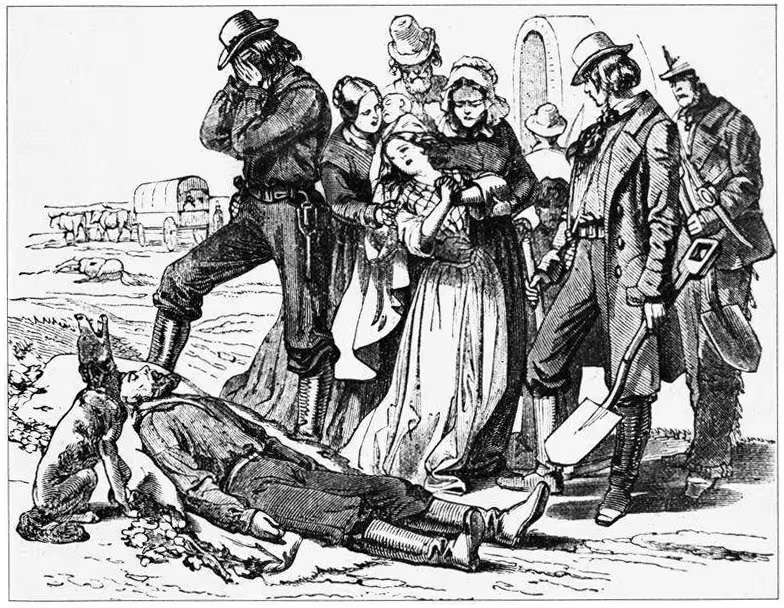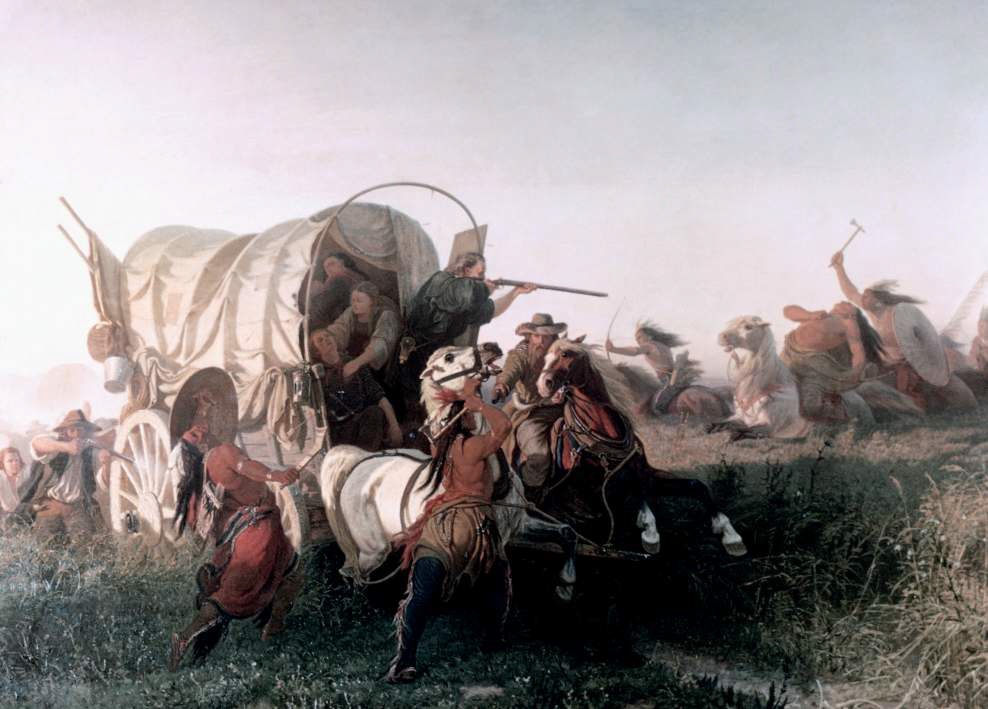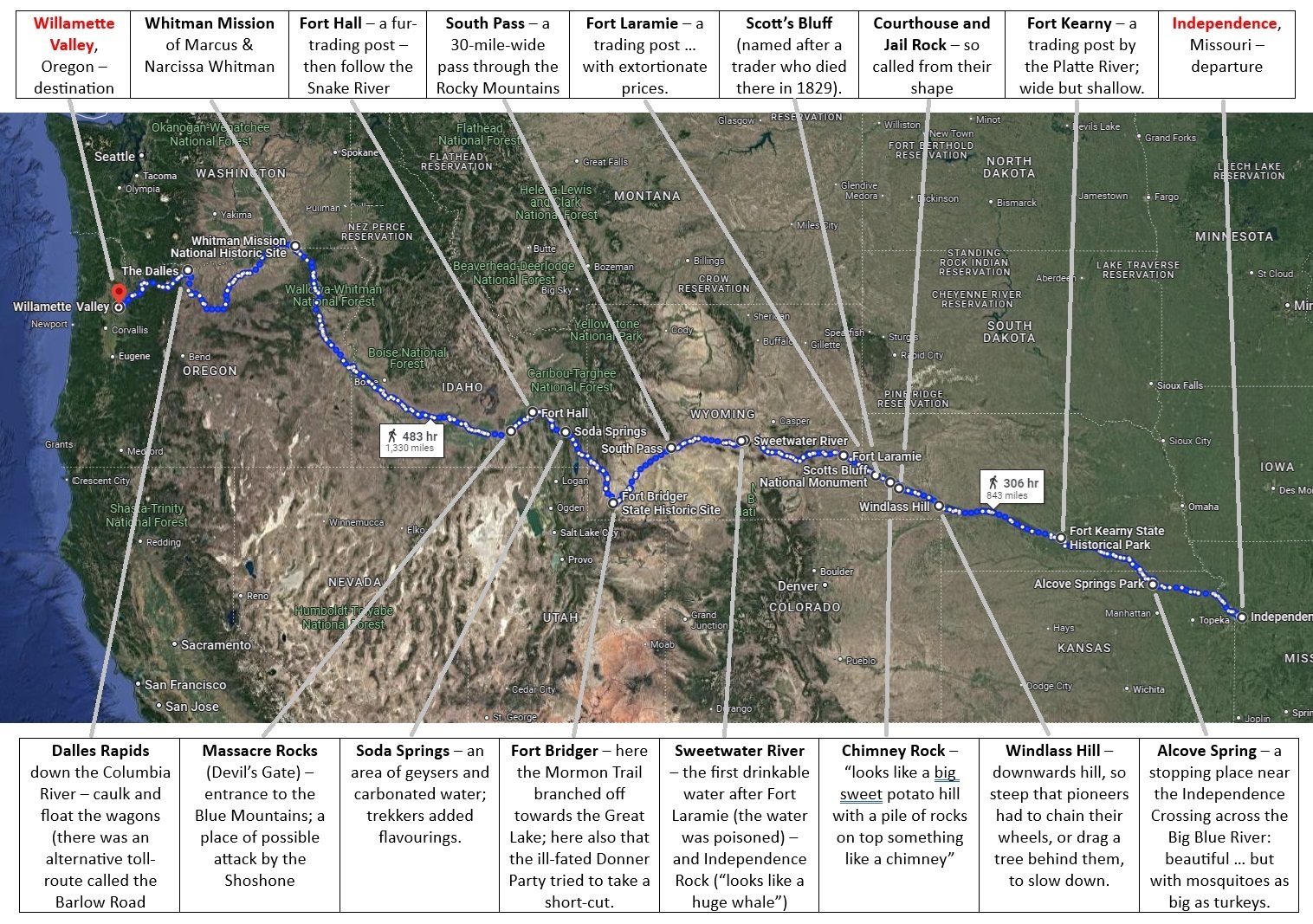CASE STUDY – The Sagars
• In 1844, Henry Sagar, his wife Naomi, and their six children started out from Missouri to Oregon with a group of 323 people and 72 wagons.
• The trip was tough from the beginning, with heavy rain, muddy prairies, and dangerous river crossings.
• Five weeks in, Naomi gave birth to their seventh child, adding more challenges as they travelled.
• On July 4, they stopped by the Platte River and hunted buffalo. Arguments broke out, and the group’s leader quit.
• In August, Catherine, one of the Sagar daughters, got her leg crushed under the wagon. She had to use crutches for the rest of the journey.
• Soon after, a sickness called "camp fever" spread through the wagon train. Henry and some of the children got sick, and Henry died trying to protect the wagon during a buffalo stampede.
• Later, Naomi also died from the sickness, leaving the seven children orphans.
• By October, the group reached the Presbyterian Mission in Oregon, where the missionaries Marcus and Narcissa Whitmans took in the children.
• In 1847, a measles outbreak struck the local Cayuse Indians. Angry that their children were dying, the Cayuse killed Marcus Whitman and two Sagar boys.
• The remaining Sagar girls were held captive but were released after a ransom was paid.
|
Did You Know
The first emigrant to die due to an accidental gunshot was named John Shotwell on May 13, 1841. When he reached for
his rifle, muzzle first, the gun went off.
Source B

Death on the Trail; comment on the emotions you see in the
drawing.
|
Source A
Tales of the Oregon Trail
“A fortnight afterwards this unfortunate party passed Fort Laramie, while we were there. Not one of their missing oxen had been recovered, though they had remained encamped a weck in search of them; and they had been compelled to abandon a great part of their baggage and provisions, and yoke cows and heifers to their wagons to carry them forward upon their journey, the most toilsome and hazardous part of which lay still before them.”
Francis Parkman
“After passing this morning through the valley in which we encamped last evening, the road brought us to the top of a high ridge, giving us a beautiful view of the mountains, running east and west, and parallel to the ridge over which we were passing. The sight was very fine, as these mountains were the first we had seen covered with pine since leaving Soda springs. This range is high and rugged, with its base well wooded; those to the left were equally as much so, while the Blue mountains to the northwest reared their peaks in dark blue masses high above the rest, and are covered with a growth of as beautiful timber as can be found between here and the Pacific ocean..”
Osborne Cross, September 6, 1849
“At Fort Hall General McCarver started out ahead of the train towards the Salmon Falls with a few packers, and on approaching them discovered some Indians and he saw a red flag hoisted. He formed his men for battle. They marched up towards the Indians believing they meant to fight. When he got near enough he discovered that the red flag was a salmon split open and spread out as a sign to the packers that they had salmon for sale. So they marched up and bought some salmon. They had a good deal of fun with McCarver...”
Ninevah Ford, 1843.
“At the Little Dalles, just above these, the current is exceedingly strong and rapid, and full of whirlpools. It is a terrific sight, and a frightful place to be in, to be drawn along in such a narrow channel between such high, craggy, perpendicular bluffs, the men with the rope clambering sometimes upon their hands and knees upon the very edge, so high above us as to appear small, like boys... They had another accident which threatened both the lives of some of them, and the property, and but for the protecting hand of God would have been lost.”
Narcissa Whitman, 8 Nov. 1836
“Do not think I regret coming. No, far from it; I would not go back for a world. I am contented and happy, notwithstanding I sometimes get very hungry and weary. Have six week's steady journey before us. Feel sometimes as if it were a long time to be traveling. Long for rest, but must not murmur..”
Narcissa Whitman, 8 Nov. 1836
“Husband had a tedious time with the wagon today. Waggon was upset twice. [When it finally gave out] he discardd the rear wheels and body, mounted a box on the front axle, and continued to Fort Hall.”
Narcissa Whitman, 8 Nov. 1836
“I will say that this part of Oregon is the most fertile for rocks and sagebrush of any part of the world that I have ever seen.”
Charlotte Stearns Pengra, August 22, 1853
“It seems that, during the process of shoeing the horse, the smothered dissensions among the emigrants suddenly broke into open rupture. Some insisted on pushing forward, some on remaining where they were, and some on going back. Kearsley, their captain, threw up his command in disgust.”
Francis Parkman
“Left camp at 6 & traveled 9 miles when we laid by on the Little Blue to give the boys an opportunity to hunt Buffalo as they have been almost wild with excitement since they came into the Buffalo country. About 10 A.M. they started off with a good supply of powder shot & ball & great anticipations but poor fellows their feathers looked sadly drooping as they came straggling into camp near night fall foot sore & weary & having secured among them all one small Antelope.”
Louisa Cook, June 13, 1862
“Next morning, at the point of leaving, a conflict took place which terminated in the death of E. Brown. Buried him & left at midnight traveling over a tolerable road… still not satisfied with the justice unfortunateness of the past day, owing all [to] the Women’s tongue.”
Arthur Menefee, 2 August 1857
“One wagon just passing...with the motto, 'Root, little hog or die'...on both sides...and on another cover is written, 'Bound for Origen.'“
E.W.Conyers, May 25, 1852
“One woman and two men lay dead on the grass and some more ready to die. Women and children crying, some hunting medicine and none to be found. With heartfelt sorrow, we looked around for some time until I felt unwell myself. Got up and moved forward one mile so as to be out of hearing of crying and suffering.”
Emigrant John Clark
“Our miserable teams had nothing but water for dinner and we had crackers and milk. At this ranch, beef, potatoes, and squashes were for sale at the following outrageous prices... beef, 25 cents per lb., potatoes, 50 cents per lb., squashes, 2 dollars each and small at that... they intend to swindle and starve us emigrants. But we will not buy from them. We will keep our money straight and live on bacon yet awhile.”
Julius Merrill, September 14, 1864.
“Passed six fresh graves!... Oh, 'tis a hard thing to die far from friends and home—to be buried in a hastily dug grave without shroud or coffin – the clods filled in and then deserted, perhaps to be food for wolves...”
Esther McMillan Hanna, 1852.
“Raining all day...and the boys are all soaking wet and look sad and comfortless. The little ones and myself are shut up in the wagons from the rain. Still it will find its way in and many things are wet; and take us all together we are a poor looking set, and all this for Oregon...I am thinking as I write, 'Oh Oregon, you must be a wonderful country'“
Amelia Stewart Knight, June 1, 1853
“Started at half past 4, after being up with team nearly all night. Came on to the good camp at spring. On our way here at Powder River we killed a noble salmon, taking breakfast out of him, and a fine dish it was.”
David Maynard, September 1, 1850
“Such sharp and incessant flashes of lightning, such stunning and continuous thunder, I had never known before. The woods were completely obscured by the diagonal sheets of rain that fell with a heavy roar and rose in spray from the ground. The storm ceased as suddenly as it began. The thunder here is not like the tame thunder of the Atlantic coast. Bursting with a terrific crash directly above our heads, it roared over the boundless waste of the prairie, seeming to roll around the whole circle of the firmament with a peculiar and awful reverberation. The lightning flashed all night.”
Francis Parkman, 1846
“The great cause of diarrhea, which has proven to be so fatal on the road, has been occasioned in most instances by drinking water from holes dug in the river bank and long marshes. Emigrants should be very careful about this.”
Abigail Scott, June 8, 1852.
“The road to-day was very hilly and rough. At night we encamped within one mile of Fort Hall. Mosquitoes were as thick as flakes in a snow-storm. The poor horses whinnied all night, from their bites, and in the morning the blood was streaming down their sides.”
Margaret A. Frink, July 11, 1850
“There is some of the largest rattle snakes in this region I ever saw, being from 8 to 12 ft. long, and about as large as a man's leg about the knee. This is no fiction at all.”
Amelia Hadley, July 19, 1851
“Those who crossed the plains…never forgot the ungratified thirst, the intense heat and bitter cold, the craving hunger and utter physical exhaustion of the trail…But there was another side. True they had suffered, but the satisfaction of deeds accomplished and difficulties overcome more than compensated and made the overland passage a thing never to be forgotten.”
An Emigrant Pioneer
“To enjoy such a trip… a man must be able to endure heat like a Salamander, mud, and water like a muskrat, dust like a toad, and labor like a jackass. He must learn to eat with his unwashed fingers, drink out of the same vessel as his mules, sleep on the ground when it rains, share his blanket with vermin, and have patience with mosquitos. He must cease to think, except of where he may find grass and water and a good camping place. It is hardship without glory.
Anonymous Settler writing in the St. Joseph, Missouri Gazette
“We are in the Powder river country and begin to see forests of Pine & Fir. Came down the mountain into Grand Ronde vally – a perfect gem – an oasis in a desert. The descent was made with difficulty – the wagons being chained & let down with ropes much of the way...Thousands of horses – many of them curiously spotted feed upon the mountain side. Hundreds of Indians of the Nez Percies tribe, are camped here...”
Harriet Talcott Buckingham, Sept. 8, 1851
“We arrived at Grande Rond. We had a feast from the Cayuse Indians. We had some nice elk meat and boiled it with dried huckleberries and plenty of flour. We had a royal meal as we thought.”
John Burch McClane, 1843.
“We camped at a place where a woman had been buried and the wolves dug her up. Her hair was there with a comb still in it. She had been buried too shallow. It seems a dreadful fate, but what is the difference? One cannot feel after the spirit is flown.”
Agnes Stewart
“We did not meet any sickness nor see any fresh graves until we came in on the road from St Joseph. From that out, there was scarcely a day, but we met six and not less than two fresh graves.”
Elizabeth Keegan, 18
“We have been traveling among the hills and the monotony has been relieved by the ever varying beauty of the scenery and the pleasantness of the weather. Today we traveled till noon, and then stopped to get a fourth of July dinner and to celebrate our nation's birthday. While making the preparation, and reflecting at the same time of what the people of Morton and Peoria were doing, and contrasting my situation with what it was this day last year, a storm arose, blew over all the tents but two, capsized our stove with it delicious viands, set one wagon on fire, and for a while produced not a little confusion in the camp. No serious injury, however, was done.”
Elizabeth Wood, July 4, 1851
“We have good roads comparatively. We mean good roads if the sloughs are not belly deep and the hills not right straight up and down and not rock enough to turn the wagon over.”
Henry Allyn, August 11, 1852
“We passed today the nearly consumed fragments of about a dozen wagons that had been broken up and burned by their owners: and near them was piled up, in one heap, from six to eight hundred weight of bacon, thrown away for want of means to transport it further. Boxes, bonnets, trunks, wagon wheels, whole wagon bodies, cooking utensils, and, in fact, almost every article of household furniture were found.”
Captain Howard Stansbury, 1852
“Word was passed that a woman had been accidentally run over and killed instantly... The woman was getting down from the moving vehicle, her clothing caught on the break-rod and she was thrown forward beneath the wheel.”
Ellen James Bailey Lamborn, September 3, 1864.
“The first day’s slow journey brought us to the Missouri River, over which we were ferried in the twilight,
and our first campfire was lit in Indian territory. This spread in one unbroken, unnamed waste from the
Missouri River to the borderline of California. This was the start of my terror. Around us in every direction
were groups of Indians sitting, standing and on horseback, as many as two hundred in the camp. I had
read and heard stories of their bloody deeds, the massacre of harmless white men, torturing helpless
women, carrying away captive innocent babies. I felt my children the most precious in the world, and
I lived in fear that first night. The Indians were friendly, of course, and swapped ponies for whisky and
tobacco with the gathering bands of emigrants. My initial fears were eventually overcome.”
Luzena Walter remembering her journey along the Oregon Trail in 1849,
which she made with her husband and two small children..
|
Source C

Attack on an Emigrant Train, by Charles Wimar (1856).
Wimar painted this scene after hearing stories of wagon trains being attacked by Native Americans.
Consider:
1. Look at the Case Study telling the story of the
Sagars; how many of the 12 hardships did that family suffer?
2. Source A contains diary entries and
memories of people
who travelled the Oregon Trail. Study them, deciding which of
the 12 hardships each illustrates. Try to note at least one
quote for each hardship.
3. Was EVERYONE's experience unremittingly awful?
Find some happy experiences.
4. Study Source C. Compare it to what
you know about the relations between the wagon trains and the
Indigenous Nations. How reliable is it as an representation of
that relationship?
5. Use your notes to plan an essay: "What
hardships and dangers did the 1840s pioneers experience on the journey
west".
6. Go back to the quotes in Source A.
Identify the ones written by women. Make notes and use them to
discuss the experience of women on the Trek.
7. Use your notes to plan an essay: "What
hardships and dangers did women pioneers experience on the journey
west".
|


